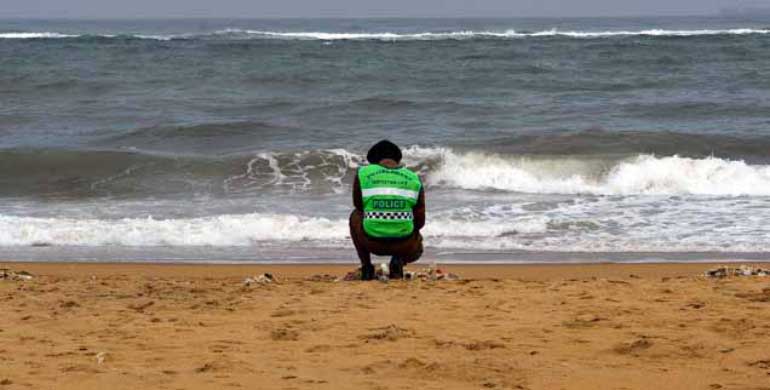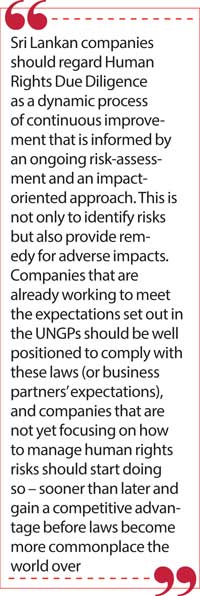Monday Feb 23, 2026
Monday Feb 23, 2026
Tuesday, 24 August 2021 03:38 - - {{hitsCtrl.values.hits}}

Smart companies are now transitioning from Corporate Social Responsibility to Business and Human Rights. Glossy photos in annual reports and websites of a company donating money or aid to charities or planting a few trees as part of their CSR just doesn’t cut it anymore. Companies have seen the need to go public about the ways they are addressing social and environmental issues – Pic by Shehan Gunasekara
Today we are past the halfway mark of 2021 and the business landscape yet remains dominated by COVID-19 and the global response to its effects. Last year all across the globe, corporate culture and values gained significant attention as the pandemic, social and racial unrest, and political dissension compelled companies to take a public stand for the values they claimed to champion. 
Year 2020 also demonstrated that companies needed to remain socially aware. Various surveys to date have indicated that consumers will walk away from brands that don’t align with their values and are likely to gravitate towards brands that do. Companies are spending more time and energy than ever on positioning themselves as ethical and sustainable and by demonstrating that company values and human rights policy statements are more than just words.
Issues and challenges such as human rights and climate change are featuring ever higher in the public radar. Businesses seen as behaving irresponsibly in these areas are likely to lose trust, customers and value. Such companies are adopting a human rights lens to their operations and placing emphasis on the most vulnerable groups that maybe adversely impacted. They are increasingly seeing that the arising reputational risk from rights abuses may not be something a company could bounce back easily from.
Progressive businesses today have quite a lot of critical areas to consider meeting expectations in the eyes of the law, their business partners and other stakeholders. They need to cut through the complexity of various legislation, international standards and global goals, including what’s actually expected of business when it comes to managing risks to people and responding to climate change; how the legal landscape changing, and what are the consequences of getting it wrong? It’s important to recognise that the human rights arena is evolving rapidly and becoming more mainstreamed with business.
10-year milestone of the UN human rights standards for business
This year marks the 10-year milestone of the UN human rights standards for business, and globally companies are increasingly integrating human rights into their corporate strategies. Although the Guiding Principles (UNGPs) are voluntary, it essentially provides the roadmap for governments and businesses on how to respect people and the planet. It’s quite significant to see how the global business landscape has evolved from the standards of the UNGPs to the numerous government and business policies that are now in place globally. Today, a decade on, human rights is regarded as a key performance indicator for most companies all over the world.
Other leading global standards, such as the ILO Declaration on Fundamental Principles and Rights at Work, the OECD Guidelines for Multinational Enterprises, and the OECD Due Diligence Guidance for Responsible Business Conduct, as frameworks can help companies embed human rights into business operations. The UNGPs in particular have helped identify and articulate a global consensus on human rights that both States and business enterprises can integrate into their operations. The UNGPs have served as the global soft law standard for the past decade and is now being incorporated into European Union hard law – applicable to any business above a certain size operating in the EU’s internal market, irrespective of nationality. This clearly demonstrates the growing acceptance of human rights responsibilities of businesses over the last 10 years.
Business responsibility moving beyond CSR
Smart companies are now transitioning from Corporate Social Responsibility (CSR) to Business and Human Rights. Glossy photos in annual reports and websites of a company donating money or aid to charities or planting a few trees as part of their CSR just doesn’t cut it anymore. Companies have seen the need to go public about the ways they are addressing social and environmental issues. They now know the inherent reputational risk they run if they do not back up their various policy statements and ‘ethical’ intents with real action.
Media and activist bodies will be actively on the case of such companies as been disingenuous and will be accused of ‘greenwashing,’ and ‘white washing.’ Being a responsible business means policy commitments, company values, strategy and business decisions should align. At the same time corporate boards should be equipped with expertise to “know and show” their company’s human rights risks, as well as the tools to set robust policies and processes to address them. Leadership from the top is critical to understand issues from a human rights perspective. This also means engaging appropriate human rights expertise that can effectively help companies to translate the theory into actionable initiatives and demonstrate transparency.
Companies that confidently disclose their supply chain partners within their supply chain are able to build trust and goodwill with their stakeholders. The OECD, European Union, International Standards Organisation and others have already aligned with the UN principles. Mainstream CSR now needs to recalibrate.
Importance of ‘S’ in ESG
Over the last six to eight years investors have become increasingly interested in Environmental, social, and governance (ESG) issues. Previously they have traditionally been of secondary concern to investors. But in recent years, institutional investors and pension funds have grown too large to diversify away from systemic risks, forcing them to consider the environmental and social impact of their portfolios. Going beyond the “E” in “ESG,” the COVID-19 pandemic and recent developments involving social justice movements have increased regulatory and investor attention on social and governance issues.
The influence of ESG in the business processes of many companies is becoming increasingly more pronounced. The ‘S’ in ESG covers human rights, modern slavery, corporate security, diversity, employee relations, supply chain sustainability, and consumer relations among others.
Internationally, most banks have included respect for human rights in their ESG policies and due diligence processes. For example, if an apparel company in the West wants to take out a loan from a bank, that company/person would not stand a chance of securing that loan if there is a whiff of child labour in its supply chain. This includes the supply chain that extends to other sourcing countries such as Sri Lanka. The bank may exercise due diligence according to ILO standards and require the company to provide evidence that demonstrates implementing policies that prevent child labour, conducting risk assessments, as well as reporting and communicating on how child labour has been addressed.
Given the heightened scrutiny on financial institutions, when it comes to preventing risks to the bank itself, banks will not give loans to any business until they have conducted comprehensive assessment as part of their human rights due diligence, which thus has a broader scope than a bank’s usual due diligence. Businesses should take a proactive role in embracing every letter of ESG as clearly understanding ESG risks and opportunities is a focus worth investing in for the long haul.
Audits alone isn’t proof of responsible business conduct
With the adoption of the UNGPs and the subsequent positioning of due diligence as the global standard of practice for companies on human rights, social audits are increasingly being used by companies to comply with their due diligence obligations. However, companies must be clear that social auditing alone is not a substitute for human rights due diligence. Audits only provide a periodic snapshot of a situation in time.
Brands that outsource production to low-cost countries such as Sri Lanka depend on audit firms to check working conditions at suppliers. In recent times however, social auditing by private companies has, repeatedly failed to detect and prevent major catastrophes. Numerous reports have found the practice to be ineffective in capturing human rights abuses in global supply chains, and ultimately in its current form to be failing workers.
For example, last year the USA prohibited the import of Top Glove products, saying it had found reasonable evidence indicative of forced labour practices at the company’s production facilities across Malaysia. This was despite 28 social audits that had been conducted in 2017-18 by their customers and third-party auditors in agreement with internationally recognised standards. Incidents such as the Rana Plaza collapse in Bangladesh in 2013 in which over 1,100 workers died and 2,000 were injured, and the Ali Enterprises fire in Pakistan, both of which were audited shortly before the tragedies happened, have drawn attention to the pitfalls of social auditing in the textile and apparel sector.
Lankan companies need to understand that citing social audit results to demonstrate that they are not violating any human rights in their supply chains will not be regarded as a substitute for comprehensive human rights due diligence. It will not suffice. Internationally there is much being done towards regulating the social audit industry and ensuring legal avenues for accountability given the systematic limitations of the model.
EU-wide legislation on mandatory human rights and environmental due diligence
Lankan companies need to ready themselves to meet the expectations of the current and emerging international legislation including the forthcoming EU-wide legislation on mandatory human rights and environment due diligence that will most certainly impact companies in Sri Lanka.
Currently EU companies’ supply chain mapping remains limited to mostly tier 1 suppliers (their first level of business partner contacts). Many of these did not extend to countries in the Global South. However, there are strong indications that the proposed law will have a wide scope with the potential to apply to non-EU based companies and contain sanctions for non-compliance. This means that there needs to be thorough scrutiny of a company’s business relationships including its subsidiaries, with its suppliers, and contractors that are based overseas. Therefore, Lankan companies that have rights violations in their supply chains could be impacted in many ways ranging from limited access to European markets, heavy penalties, and damaged reputations that will keep buyers and investors away. Companies should start sooner than later to gear up to face these new requirements within their supply chains to meet internationally accepted social and environmental standards. They must demonstrate adherence to these standards as it would lead to better quality products, and high value-added exports. This is what Sri Lanka needs – especially at this juncture.
Today claiming the lack of awareness of human rights violations in supply chains is no longer an excuse. All businesses – including SMEs, need to make respect for human rights part of their corporate strategy. Also, when conducting due diligence, business-related impacts on vulnerable groups such as women, children, migrant workers and even informal workers should be taken into account, since those groups are invariably disproportionately negatively affected.
Planned EU action on deforestation-free supply chains and implications for Sri Lanka
This EU law is intended to protect the world’s forests and ecosystems and ensure deforestation-free supply chains. It seeks to minimise the risk of products linked to global deforestation being placed on the EU market. This will impact on companies based or operating in the EU as well as on those exporting to the EU from third countries such as Sri Lanka. It also sends a clear signal to business that sustainability can no longer be just a policy issue since the loss of our forests, wetlands and mangroves affects all.
This legislation states that commodities and products exported to the EU should not be linked to deforestation, forest degradation, ecosystem conversion or ecosystem degradation, whether legal or illegal. It emphasises that producing a product in compliance with the law doesn’t mean that it was produced sustainably, let alone free from links to deforestation or human rights abuses. What is excellent about this is that it deems that “legality” isn’t proof enough that a product is deforestation-free, especially in countries with insufficient legislation and weak law enforcement, or where laws protecting the environment and forest communities are under attack or totally ignored. The ongoing environmental crisis in Brazil clearly typifies how only relying on formal legal criteria gives reckless governments, not just a free rein, but a reward for environmental destruction and corruption. Sri Lanka can do better than that.
In the consultations carried out there have been many calls for the European Commission to consider legally enforceable provisions protecting forests, ecosystems and rights when negotiating trade agreements with non-EU countries. This would mean setting the legal baseline that any trade agreement would be founded upon. Through that, the aim would be to guarantee that products coming on to the EU market are not causing deforestation, forest degradation or biodiversity loss elsewhere. For Sri Lanka, factors such as the lack of cross-sectoral coordination, unclear or inappropriate legal and policy frameworks, poor or absent land-use planning, land grabs and illegal deforestation, corruption, and the lack of law enforcement and poor legal and policy frameworks could hamper actors from being able to take steps towards production that reduces or halts the impact on forests.
Sri Lanka as a sourcing country will need to rethink its investment attraction strategy as EU (and global players) look increasingly at investment hubs that help them minimise the risk of noncompliance with due diligence legislation. This means having a conducive investment framework bringing in solid labour law and environmental law into the picture, a functioning collective bargaining system, and labour inspections, etc. Businesses with a social and/or environmental mission are able to uphold the highest standards and best practices for eliminating deforestation in their supply chains and still remain viable and competitive.
Related to this planned EU action on deforestation-free supply chains, another recent international development has been a “historic” definition of ecocide, drawn up by legal experts from across the globe and intended to be adopted by the international criminal court to prosecute the most flagrant offences against the environment. Upon adoption by the members of the International Criminal Court (ICC), it will place the environment at the heart of international law, and in a broader context will be able to prosecute companies as well as countries that that engage in environmental destruction and landgrabs.
Implications for Sri Lanka’s business relationships
Germany has already introduced its draft Supply Chain Act, which will come into force from 1 January 2023. The national mandatory due diligence imposes substantive fines on companies procuring parts or materials abroad from suppliers (for example in Sri Lanka) who fail to meet minimum human rights and environmental standards. The termination of business relationships altogether will occur if no efforts are seen to be in place to mitigate human rights violations by suppliers, including internal grievance mechanism for poor conduct relating to social and environmental rights violations by the company or its direct or indirect suppliers.
France launched its supply chain legislation back in 2017 with the ‘Duty of Vigilance Act’. This requires all large French companies – with over 5,000 employees in France or over 10,000 worldwide – to undertake due diligence with regard to the companies they control and all their contractors and suppliers. The Dutch legislation ‘Child Labour Due Diligence Act’ came into effect in 2019 and obliges Dutch companies to investigate whether their goods or services have been produced using child labour and to develop a plan to prevent child labour in their supply chains. The Dutch Due Diligence Act imposes significant administrative fines, criminal sanctions for non-compliance. In early June (2021) the Norwegian parliament adopted the Transparency Act, that places onus on large and mid-size companies to conduct human rights and decent work due diligence not only throughout their supply chain, but throughout all business relationships in their value chain. The move toward mandatory measures inspired by the Guiding Principles continues beyond Europe. Recently the US Secretary of State Tony Blinken announced that the United States would update its National Action Plan (NAP) on Responsible Business Conduct. This also reinforces their commitments to leverage procurement/sourcing power by barring organisations from engaging with companies that are not exercising human rights due diligence and implementing strict enforcement of rules to prevent goods that are manufactured while failing to respect human rights and labour rights are blocked from entering the USA market. Given that the USA is the single largest export destination for Sri Lanka, businesses need to continue to ensure that their supply chains are free from rights violations.
Way forward
Lankan companies should regard Human Rights Due Diligence as a dynamic process of continuous improvement that is informed by an ongoing risk-assessment and an impact-oriented approach. This is not only to identify risks but also provide remedy for adverse impacts. Companies that are already working to meet the expectations set out in the UNGPs should be well positioned to comply with these laws (or business partners’ expectations), and companies that are not yet focusing on how to manage human rights risks should start doing so – sooner than later and gain a competitive advantage before laws become more commonplace the world over.
It is very important to be clear that these new and emerging international legislation do not in any way let governments off the hook. Quite the contrary. Governments now need to take proactive measures to create a level playing field for businesses and also set very clear expectations of companies and ensure accountability, transparency and their adherence to responsible and ethical business practices.
[Anisha Rajapakse is a senior global expert with two decades of progressive experience working at the intersection of business, human rights and international development. Till recently she was in Brussels with the Foreign Trade Association. Anisha works with businesses globally on promoting responsible business practices and ensuring sustainable global supply chains in line with the UN Guiding Principles on Business and Human Rights (UNGPs). She was recently appointed to the international board of the Rainforest Alliance.]